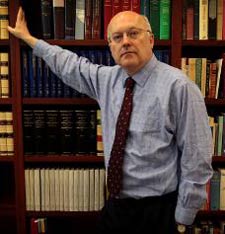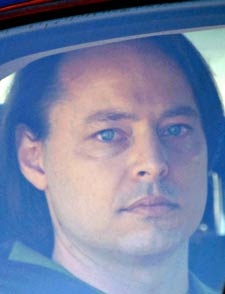Soapy Brandis still nagging about David Hicks ... The shadow AG's big policy gesture: confiscate the proceeds of Hicks' book ... It is far from clear that this is possible  Brandis: visionaryThe war on terror remains stuck in the same wretched groove, if Soapy Brandis' burst in The Australian last Friday (March 11) is anything to go by.
Brandis: visionaryThe war on terror remains stuck in the same wretched groove, if Soapy Brandis' burst in The Australian last Friday (March 11) is anything to go by.
The Liberals' justice spokesman has been banging the drum for a proceeds of crime prosecution against David Hicks over his book, Guantanamo - My Journey.
The prosecution should happen without "further delay", insisted the shadow AG. This is the Liberals' brave and imaginative policy frontier. It doesn't get much more thrilling than this.
The failure to prosecute Hicks under the Proceeds of Crime Act rankles with Soap and other Coalition blowhards because it diminishes the importance the Liberals' attached to the "crimes" of this "convicted terror supporter".
Random House published Guantanamo - My Journey in October last year. The print run was 70,000 and Brandis immediately miscalculated this to mean that Hicks "stood to earn $350,000".
In a pre-trial agreement dated March 26, 2007 Hicks pleaded guilty to one charge of "providing material support for terrorism".
Under the agreement he agreed to assign to the Australian government, "any profits or proceeds which I may be entitled to receive in connection with any publication or dissemination of information relating to the illegal conduct alleged in this charge sheet".
He also agreed not to communicate with the media for one year "in any way" regarding the conduct charged.
On Friday Brandis said:
"There appears to be little doubt that whether under Proceeds of Crime Act or the plea agreement, the royalties earned by Hicks from his memoir are recoverable by the Australian government."
Well actually, there's plenty of doubt, and maybe that's why the AFP and Commonwealth DPP are proceeding cautiously.
The offence of material support for terrorism itself is unknown to the law of war. It exists in federal criminal law, but was imported into the military commission process and turned into a war crime by Congress after the first military commission regime collapsed following the Supreme Court's decision in Hamden v Rumsfeld.  Hicks: "guilty" of an offence unknown to law of warIn other words, the law was created after Hicks' alleged offence.
Hicks: "guilty" of an offence unknown to law of warIn other words, the law was created after Hicks' alleged offence.
Law of war guru, Prof David Glazier wrote in the Balkin blog:
"The crime Hicks pleaded to ... is a felony triable in regular federal courts, but not a law of war violation military commissions can lawfully try...
Retroactive jurisdiction is only permissible over acts clearly violating international law at the time they were committed.
Jurisdiction over Hicks, whose conduct dates back to 2001, would be unlawfully ex post facto.
The government bears the burden of proving that this offence violates the law of war, for which I have found no precedent in five years of academic research into military justice and law of war.
If the commission lacks jurisdiction over the charge, any court reviewing the decision per se, or Hicks' subsequent incarceration, should be obliged to set the conviction aside or order his release from custody."
In 2007 Australian lawyers and legal academics weighed-in with an opinion that the post-Hamden military commissions still suffered from the same defect as the first military commissions - in particular they did not comply with the Geneva Conventions.
"A military commission established under the Military Commissions Act of 2006 would contravene the standards for a fair trial under Australian law, namely the standards provided for in the Australian Criminal Code, and counselling or urging a trial to take place before any such military commission with the requisite knowledge and intention would constitute a war crime under the Australian Criminal Code."
Hicks' plea deal was flawed and it is entirely possible that the offense to which he pleaded guilty stands a strong chance of being struck down in proceedings currently before the Court of Military Commission Review.
Here is the US government's submission in the current CMCR appeal.
It is unlikely the plea agreement would be enforceable here or in the United States. Politically, it would be well-nigh impossible for an Australian government to support any American application for Hicks to be returned to the United States.
As for a case under the Proceeds of Crime Act, again there are difficulties, which were splendidly outlined by Lucas Bastin in a 2009 paper for the Federal Law Review.
He says it is arguable that the charge triable by military commission, to which Hicks' pleaded guilty, is not sufficient to establish a "foreign indictable offence" under the POCA.
This is because the definition of "foreign indictable offence" in the POCA referred to an offence that was triable before the Guantanamo military commissions as originally constituted, and which were found invalid in Hamden v Rumsfeld.
The subsequently constituted military commissions are not specifically included in the POCA's definition of foreign indictable offences.  Walker: advised HicksBastin also points out that it is not evident that any benefits that flow from the publication of the book are within Hicks' "effective control".
Walker: advised HicksBastin also points out that it is not evident that any benefits that flow from the publication of the book are within Hicks' "effective control".
Random House received pre-publication advice from Sydney barrister Richard Potter and Hicks from Gilbert + Tobin and Bret Walker SC.
It appears that the AFP must have sought information from Random House and Hicks and there is now a certain amount of nervousness, beyond the publisher simply saying it and the author both received advice that there was no legal impediment to publishing.
Under s.210 of the POCA people who disclose that they have been served with a "production order" by the coppers can face up to two years in the nick.
The South Australian parliament passed legislation after Hicks' guilty plea in 2007, which specifically provides for a literary proceeds order relating to publications dealing with offences triable before the Guantanamo military commissions.
That is one of the reasons Hicks now lives in NSW.
The Commonwealth DPP brought POCA proceedings in relation to the Shapelle Corby book, My Story, which was co-authored by journalist Kathryn Bonella and published by Pan Macmillan.
The Queensland Court of Appeal in March 2007 ordered the payments received in Australia by the authors, as well as payments that Mercedes Corby received for interviews with New Idea, to be frozen.
The orders also froze further payments the Corby family might receive for media appearances.
The Commonwealth's application was made ex parte and heard in closed court.
Subsequently, in April 2009, the Queensland Supreme Court ordered that the authors could keep $270,000 of the literary proceeds, but that the Commonwealth could retain another $128,000.
No reasons were published by the court.
Chopper Read's book, Chopper, with its lurid descriptions of various murders, was not subject to POCA proceedings.
Brandis has been handsomely supported in his campaign by The Australian's legal affairs section.
The most recent effort from Chris Merritt claimed that it would be a "catastrophe" and a "nightmare" for the government if it cannot scrape back Hicks' earnings from the book.
Of course, this assumes the author has "effective control" of the money. Merritt complained:
"If the conviction is viewed as invalid under Australian law, it would mean the federal government had no legal basis for keeping him in prison."
To which we say, "hooray to that".